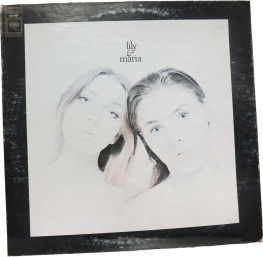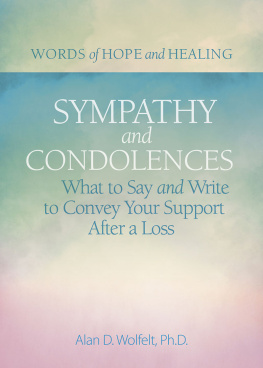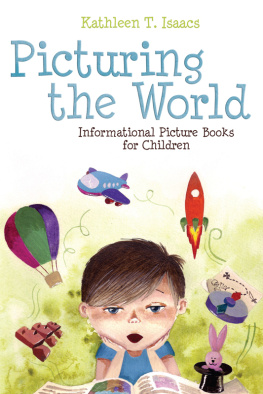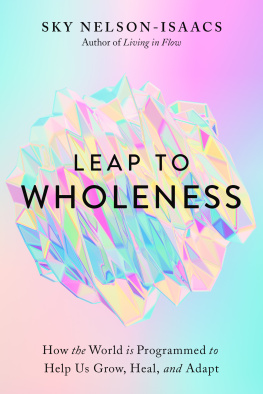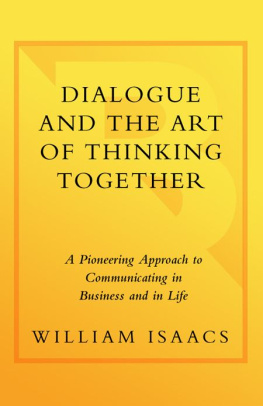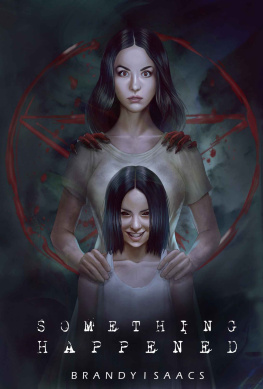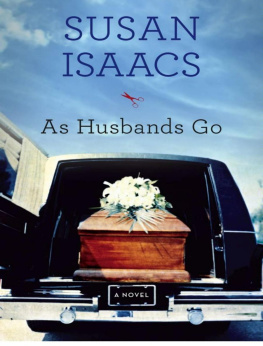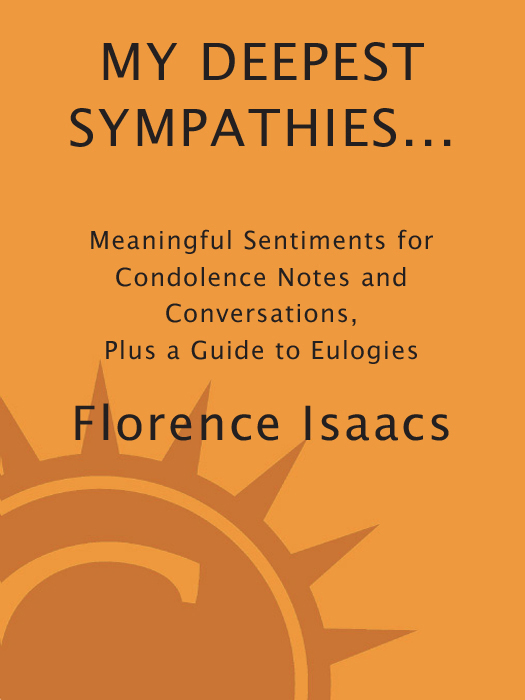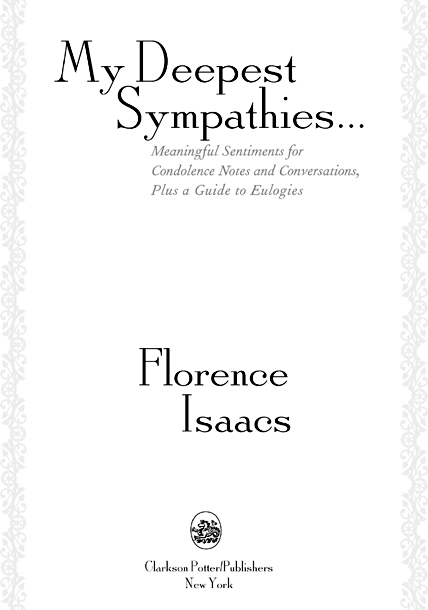Many people contributed to this book, providing a wealth of information I couldnt have done without. I especially wish to thank Suzy Powell, a great lady; my friend Sam Perelson of Perelson Weiner CPAs; and Frank Gribbon, editor, Fire Lines, Uniformed Firefighters Association of Greater New York. Your input added immeasurably to this project. I thank my colleague Pat McNees, author of Dying: A Book of Comfort, for generously sharing her experiences. As always, family therapist Karen Gail Lewis, Ed.D., co-editor of Siblings in Therapy was extraordinarily helpful. I thank Mary Jo Dahm for her aid.
For their insights, I also thank Chris Ulrich, C.S.W., Long Island Jewish Medical Center; Camille Wortman, Ph.D., professor of psychology, State University of New York at Stony Brook; Susan Kavaler-Adler, Ph.D., clinical psychologist in private practice in Manhattan and author of The Compulsion to Create and Mourning and Psychic Transformation: Facing the Demon Lover Within; Kenneth Doka, Ph.D., coauthor of Grief Beyond Gender; Bruce Patterson, C.S.W.; grief counselor Nancy Burns; Reverend Robert Corin Morris, director, Interweave; Henry M. Seiden, Ph.D., coauthor of Silent Grief: Living in the Wake of Suicide; Stephanie LaFarge, Ph.D., director of counseling services, ASPCA of New York; Ann Douglas, coauthor of The Unofficial Guide to Having a Baby; Jean Coffey; Iman Yusuf Hasan, staff chaplain, Memorial Sloan Kettering; Sister Janet Baxendal; and Rabbi Harlan J. Wechsler, Congregation Or Zarua.
I also thank, for their invaluable assistance, George Burke, International Association of Firefighters; John Horan, president, Horan & McConaty Funeral Service/Cremation, Aurora, CO; John Carmon, Carmon Community Funeral Homes, Windsor CT; The Health Care Chaplaincy; and The Compassionate Friends.
Contents
The basics for writing good notes and for conversations
What to write when someones mother or father dies
What to write when someones husband, wife, ex-spouse, significant other, or companion dies
What to write and say when someones child, stepchild, or grandchild diesand in cases of miscarriage and stillbirth
What to write and say when a brother, sister, grandparent, aunt, uncle, other relative, or friend dies
Death of a Pet
Responding with sensitivity
What you need to know about funerals, memorial services, wakes, calling hours, burials, cremations, shiva, memorial contributions, and sending flowers or food
Techniques for any situation
Introduction
The blank sheet of notepaper sits on your desk for days, as you obsess over what to write to a former coworker whose wife died in an auto accident. No wonder you cant pick up a pen. What can you write when a mother of three dies at forty-five? If you callor go to the funeralwhat can you possibly say to the grieving husband? Its no easier when your friends ninety-year-old father succumbs to heart failure. What is there to say when the person has lived to old age and the death is not unexpected (or unwelcome in some cases)? Yet someone you care about has lost her fatherand everything that comes to mind sounds like a clich.
If the dilemma sounds familiar, youre not alone. Strong men squirm at the task of extending sympathy to someone who has lost a loved one. Women, who are normally more expressive, feel uncertain and often tongue-tied. Why does someone elses grief make us so uneasy? We feel helpless in the face of profound loss. Death is as final as you get. Theres nothing that can be done to change itand we dont know what to do about that.
Someone elses loss forces us to confront the subject of death. Although many other cultures view death as a natural part of the life cycle, death is not a welcome subject in a society geared to the young, the healthy, and the beautiful. Many of us have grown up without experiencing the death of someone close. People live longer; medical advances have tamed many killer diseases. We do not commonly see spouses, siblings, children, or others die around us as our grandparents and even our parents generation did.
When death does take someone we love, we are removed from it. People used to die at home, cared for until the very end by their families. As an accepted part of life, death was far less mysterious. People not only lived with the entire process, they were also surrounded and nourished by the support of relatives and community. Often, it was the family that prepared the body for burial. There was a close connection with the deatha full experience that provided strength and comfort to survivors. As people began to die in hospitals rather than at home, however, and funeral homes handled the rest, we became distanced from the process. Death became more frightening, something to be whispered about, tiptoed around, rather than openly acknowledged.
A death in someone elses family also stirs our own deepest fears of mortalityand of losing those we love. Its a reminder that our parent or spouse or child can be taken. If our own families were a poor role model in dealing with death, that adds to feelings of insecurity. When I was growing up, a death was talked about in hushed tones as if there was something to hide, as if the person grieving might shatter into pieces if the deceased was mentioned. Yet to pretend that death hasnt really happened is to isolate us rather than bring us together.
In my family, feelings about the loss were never discussed. Funerals were considered for adults only, which added to a generalized fear. Years ago when my best friends father died, I felt so anxious about attending the funeral I managed to show up late. The hearse was pulling away from the curb as I arrived, and deep down, I felt relieved. It was a tribute to my friends devotion that she was able to understand and forgive me.
Of course we also fear that we will make a mistake, say or do something wrong, and make matters worse for the bereaved. Today, its easier than ever to err no matter how well-intentioned we try to be. Myths about what is or isnt helpful to the grieving family can lead you astray. Situations that didnt exist years ago add to the confusion:
Social changes have created delicate situations. Couples are no longer necessarily married. The bereaved may be a significant other or a companion. The person who died may be a stepparent or stepchild, or an ex-wife or ex-husband.
Our society is multicultural. You may be expressing sympathy to someone from a culture and/or religion that you know little or nothing about. A colleague who grew up in Pakistan may have lost a brother. A neighbor originally from Japan may have lost her child. A friend who was raised in a Jewish household, but is no longer observant, loses a parent. The husband of someone from Vietnam may have died. The normal discomfort that surrounds news of a death is compounded when you dont know the customs of the bereaved.
More people live with chronic disease for long periods. The deceased may have suffered for years with cancer or Alzheimers. The death may look like a blessing for all concernedboth the deceased and those who survive.


